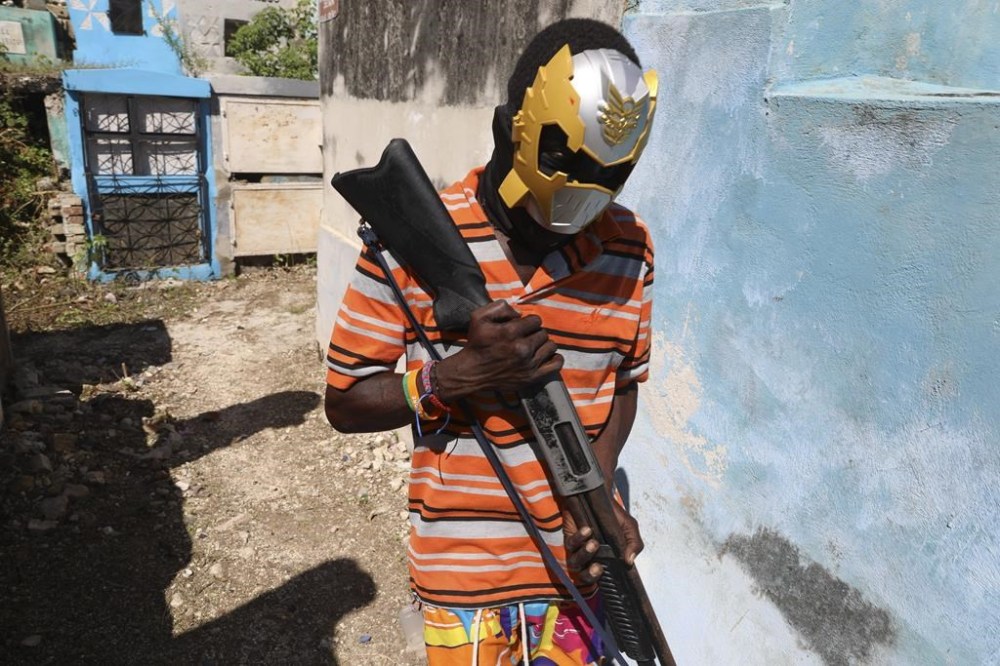Haiti has 1 million displaced people, mostly from gang violence. It’s tripled over the past year
Advertisement
Read this article for free:
or
Already have an account? Log in here »
To continue reading, please subscribe:
Monthly Digital Subscription
$0 for the first 4 weeks*
- Enjoy unlimited reading on winnipegfreepress.com
- Read the E-Edition, our digital replica newspaper
- Access News Break, our award-winning app
- Play interactive puzzles
*No charge for 4 weeks then price increases to the regular rate of $19.00 plus GST every four weeks. Offer available to new and qualified returning subscribers only. Cancel any time.
Monthly Digital Subscription
$4.75/week*
- Enjoy unlimited reading on winnipegfreepress.com
- Read the E-Edition, our digital replica newspaper
- Access News Break, our award-winning app
- Play interactive puzzles
*Billed as $19 plus GST every four weeks. Cancel any time.
To continue reading, please subscribe:
Add Free Press access to your Brandon Sun subscription for only an additional
$1 for the first 4 weeks*
*Your next subscription payment will increase by $1.00 and you will be charged $16.99 plus GST for four weeks. After four weeks, your payment will increase to $23.99 plus GST every four weeks.
Read unlimited articles for free today:
or
Already have an account? Log in here »
Hey there, time traveller!
This article was published 14/01/2025 (335 days ago), so information in it may no longer be current.
GENEVA (AP) — The U.N. migration agency says internal displacement in Haiti, largely caused by gang violence, has tripled over the last year and now surpasses 1 million people — a record in the Caribbean nation.
The International Organization for Migration reported Tuesday that “relentless gang violence” in the capital, Port-au-Prince, has fueled a near-doubling of displacement there and a collapse of health care and other services, and worsening food insecurity. Haiti is one of the poorest countries in the world.
“The latest data reveals that 1,041,000 people, many displaced multiple times, are struggling amidst an intensifying humanitarian crisis,” the Geneva-based agency said in a statement. Children make up more than half of the displaced population.

The figure marks a three-fold increase in displacement from the 315,000 in December 2023, IOM said.
Agency spokesman Kennedy Okoth told a U.N. briefing in Geneva that the forced return of around 200,000 people — mostly from neighboring Dominican Republic — to Haiti over the last year had worsened the crisis. The two countries share the Caribbean island of Hispaniola.
Okoth said that the number of displacement sites in Port-au-Prince has risen from 73 to 108 over the last year.
The outgoing administration of U.S. President Joe Biden has strongly supported and expanded a temporary status program, which allows some foreign nationals from countries like El Salvador, Haiti and Venezuela to remain in the U.S.
U.S. President-elect Donald Trump and his running mate, JD Vance, have suggested that they would scale back the use of the program and policies that grant temporary status, as they pursue mass deportations. U.S. federal regulations would allow the extensions to be terminated early, although that’s never been done before.
Asked whether IOM had any concerns about possible changes to such U.S. protections, Okoth declined to comment about any specific country.
But he said that “deportation or any forced returns to countries that are already facing mounting security and humanitarian challenges is not something that is going to be beneficial to the group.”
As Haiti continues to struggle with a surge in gang violence, the government on Tuesday swore in Mario Andrésol as the new state secretary of public security.
Andrésol, who served as director of Haiti’s National Police nearly 20 years ago, pledged to crack down on gangs and crime including weapons and drug trafficking.
“We have to think and rethink strategies to fight crime,” he said at a news conference where he held a moment of silence for victims of violence. “Everyone needs to collaborate.”
Joining Andrésol was Haitian Prime Minister Alix Fils-Aimé, who said he was taking responsibility for placing “the right people in the right job” to protect Haitians and provide security.
“The Haitian people deserve to live in peace,’ he said, adding that the country faced multiple challenges. ”If we work nonstop, that can be changed.”
Last week, the U.N. Human Rights Office noted that more than 5,600 people were reported killed in Haiti last year, a more than 20% increase compared with the previous year. In addition, more than 2,200 people were reported injured and nearly 1,500 kidnapped.
___
Associated Press reporter Evens Sanon in Port-au-Prince, Haiti contributed.

